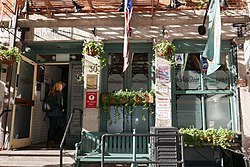| The Dead Rabbit | |
|---|---|
 Bar exterior in 2015 | |
 | |
| Restaurant information | |
| Established | 2013 |
| Street address | 30 Water St., Manhattan, New York City |
| Coordinates | 40°42′12″N74°00′40″W / 40.703261°N 74.011018°W |
| Website | thedeadrabbit |
The Dead Rabbit, also known as The Dead Rabbit Grocery and Grog, [1] is a craft cocktail bar in the Financial District of Manhattan, New York City. The bar was founded in 2013 in its location on Water Street. [2] It opened as a "cocktail emporium", evoking the drinking habits of 19th-century New Yorkers. [3] The bar's name is a reference to the Dead Rabbits, an Irish American street gang active in Lower Manhattan in the 1830s to 1850s. [4]
The establishment was rated the best bar in the world in 2016, as compiled by The World's 50 Best Bars . [2] It was also named world's best bar at the Tales of the Cocktail competition. [5]
In 2022, the bar announced plans to open locations in New Orleans and Austin, Texas, as well as a sister bar in Charleston. [2] One of the bar's owners will work with its beverage director to establish the Charleston bar, while still remaining a silent partner at The Dead Rabbit. A new beverage director would be named for The Dead Rabbit bar. [6] [3]
The bar is in the Fraunces Tavern Block Historic District, a National Historic Landmark District and a New York City designated landmark district.
The establishment has three stories, including a ground-floor taproom with basic drinks, a second-floor parlor with craft cocktails, and a third-floor, private room for parties. [5]